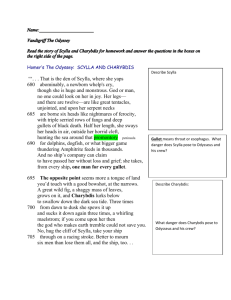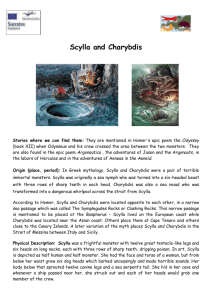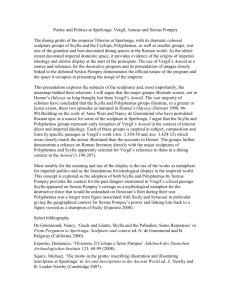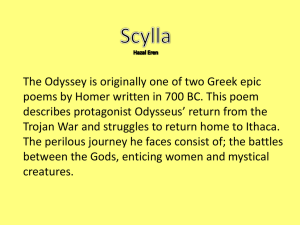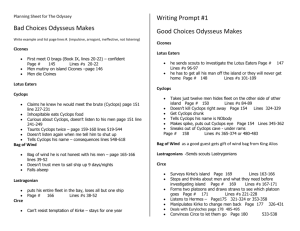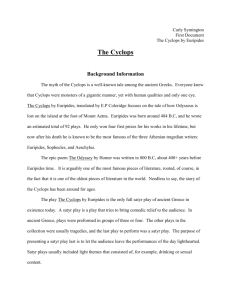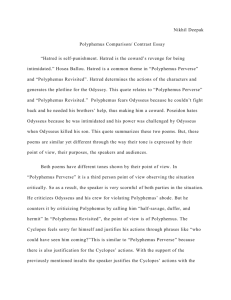Sicily into Mythology
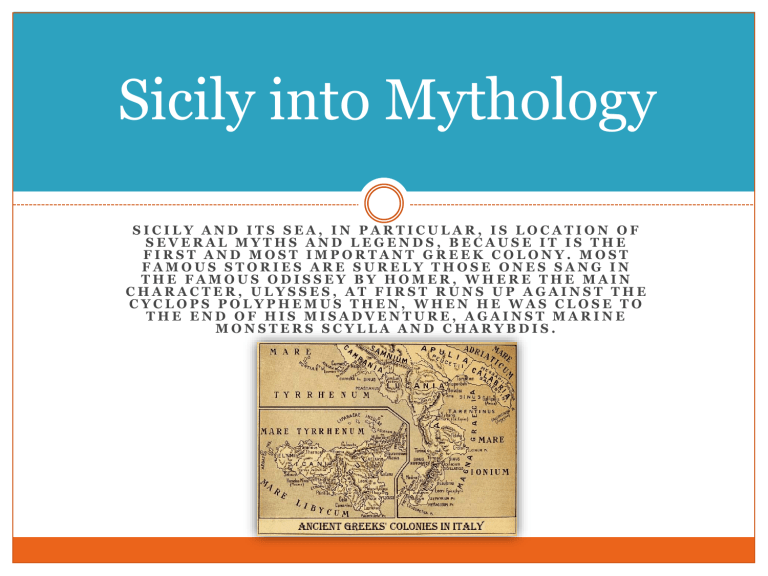
Sicily into Mythology
S I C I L Y A N D I T S S E A , I N P A R T I C U L A R , I S L O C A T I O N O F
S E V E R A L M Y T H S A N D L E G E N D S , B E C A U S E I T I S T H E
F I R S T A N D M O S T I M P O R T A N T G R E E K C O L O N Y . M O S T
F A M O U S S T O R I E S A R E S U R E L Y T H O S E O N E S S A N G I N
T H E F A M O U S O D I S S E Y B Y H O M E R , W H E R E T H E M A I N
C H A R A C T E R , U L Y S S E S , A T F I R S T R U N S U P A G A I N S T T H E
C Y C L O P S P O L Y P H E M U S T H E N , W H E N H E W A S C L O S E T O
T H E E N D O F H I S M I S A D V E N T U R E , A G A I N S T M A R I N E
M O N S T E R S S C Y L L A A N D C H A R Y B D I S .
Here’s a list of some of the most important Myths about
Sicily:
• The homeric myth of the
Cyclops
;
• The myth of the monsters
• The myth about the nymph
• The legends about the love felt by
• The myht about the volcano
.
Table of Contents
Polyphemus
In the myth described by Homer, Polyphemus is a giant half-human that lives in Sicily. He survives breeding sheeps and feeds himself eating cheese and, sometimes, humans. His aspect is characterized by the big eye he has in middle of the forehead. Ulysses and his seamen unload near Polyphemus' cave and get captured, and three of them are eaten by the Cyclops.
After a period of imprisonment, Ulysses arranges a trap.
Indeed, he offers some wine to the Cyclops who, thanking him back, before falling asleep, asks his name and Ulysses answer "No one". Then the Greeks blind the Cyclops with a wooden stake red-hot in the fire. After that, they run away with a smart trick: every one of them hangs under the fleece of a sheep and, when Polyphemus opens the cave to let them graze, they go out with the sheep. When Ulysses reaches his ship, reveals his real name to Polyphemus who throws some enormous rocks into the sea, giving birth to the famous
"Cyclops' Rocks" into Acitrezza's coast.
Scylla and Charybdis
At first, Charybdis was a woman, daughter of Poseidon and Gaia, that used to make robberies because of its gluttony. Once, she stole cattle from Heracles, and Zeus, to punish her, stroke her with a lightning making her fall in the sea where he trasformed her into a monster. The legend places her in one of the two sides of Messina's strict. Scylla, at the beginning, was a really beautiful woman. She used to swim near Zancle's beach. A night, she saw coming from the waves Glaucus, son of Poseidon, half man and half fish. Frightened by that view, she found shelter on the top of a close mountain. Glaucus started screaming his love for her, but Scylla ran away leaving him alone in his pain.
Glaucus asked a love potion to Circe, a witch, but her fell in love with Glaucus, that refused to cheat his true love for Scylla with the witch.
Circe, mad for the rejection, wanted to have his revenge giving Glaucus the wrong swill. He poured the potion into the sea where Scylla used to swim, and when she dunk in, noticed that 6 dogs heads had grown in the water and were linked to her with a snakey neck. She, scared to death, dived into the depht of the sea and reached the same cave where Charybdis lived. Now, the two monsters disturb ships' navigation into the strait, where the sea is often rough because that’s where two seas meet each other.
Aretusa
The most famous legend about Syracuse, one of the first Greek colonies in Italy, is the myth of the nymph Aretusa. While the
Nymph was running free in the woods near Corinto, she was seen by the young Alfeo,who fell in love with her. But Aretusa didn’t return the love that Alfeo felt for her, instead she tried to avoid him, until when she, tired of the harassments of the young man, asked for help to the Goddess Artemis, who was the nymph’s protectress. Artemis covered Aretusa with thick fog, melting her in a source in Ortigia, a small island near Syracuse.
So Alfeo decided to ask for helps to the Gods, who transformed him in a river that, starting from Greece and going trough the
Ionian Sea, arrived to his loved spring. With this Myth the ancient Greeks explained the strong link between Syracuse and its motherland Corinto. Indeed, they even believed that when
Corinto was in war, the waters of Ortigia became red because of the blood of the Corinthians fell in war.
Aci
According to Greek mythology, Aci was Fauno and Simetide’s son. Ovidio, in his masterpiece “The
Metamorphosis”, wrote about him: he was a beautiful shepherd, and the nymph Galatea fell in love with him.
But Galatea was the loved one of the cyclops
Polifemo who, lost the willpower because of the envy, killed Aci throwing him a boulder.
The young’s blood, flowing into the rocks, was turned in a river by Galatea. Probably the
Myth is inspired by the strange way whereby the river Aci flowed out of its Source until It was destroyed during an eruption of the volcano Etna in 1169. Still today, there are a lot of towns in Sicily that have the word
“Aci” in their name because of the nearness with the land where once a time there was this river.
Etna
Etna is the name of a goddess of Greek mythology. It was considered the daughter of Uranus and
Gaea. The dragon Typhon, it was assumed, was living in the bowels of the volcano and was causing the destructive eruptions. Sicily, land of volcanoes and wheat, was the cause of dispute between Hephaestus and Demeter, goddesses of the harvest and fire. Etna acted as arbitrator.
According to some myths inside there was the forge of Hephaestus, the god of fire and engineering, often identified with the god Adranos, from which our city gets its name.

